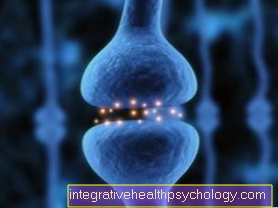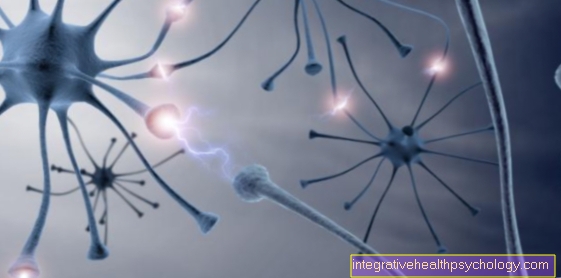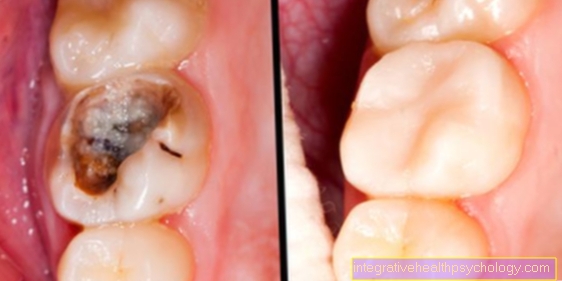Phenytoin
definition

Phenytoin is a drug that in medicine belongs to the group of anti-spasmodic agents (so-called anticonvulsants). It is mainly used to treat two different clinical pictures: epilepsy and cardiac arrhythmias.
application
With regard to epilepsy, phenytoin is used both for the therapy of acute seizures and for long-term treatment. However, phenytoin has been prescribed less frequently in the treatment of acute attacks in recent years, as newer preparations have fewer side effects and interactions with other drugs.
In the cardiology Phenytoin is mainly used when the clinical picture of the ventricular Tachycardias is present (this means too high a number of heart ventricles per minute). Ventricular tachycardias usually occur with poisoning digitalis, the poison of the thimble.
In its mode of action, phenytoin is very similar to that Lidocaine, a medicine that can be used to induce local anesthesia. Both substances block a sodium channel in the membrane of nerve cells, a structure that is responsible for the creation and transmission of information (including information about a pain stimulus) in the Nervous system are indispensable.
Phenytoin is metabolized in the liver and excreted through the kidneys.
Side effects
Some side effects are known to be associated with taking phenytoin: Dizziness has been reported, Nystagmus (uncontrollable spontaneous eye movements), double vision or also Ataxia (Disorders of movement coordination).
Furthermore, nausea, polyneuropathy (diffuse sensory disturbances due to damage to the nervous system), enlargement of the oral mucosa and hirsutism (increased body hair in women). Also about blood formation disorders, lymph node disorders, liver dysfunction and allergic reactions.
Interactions
With regard to the interactions of phenytoin with other drugs, the following distinction can be made:
There are substances that increase the level of phenytoin in the blood, such as Sulfonylureas (common for the treatment of type II diabetics), Cimetidine (an antiallergic agent), Antibiotics, Drugs for the therapy of tuberculosis and psychiatric drugs like Benzodiazepines and so-called tricyclic antidepressants (This is a specific group of mood-enhancing drugs). Also for drugs against rheumatism, the anesthetic Halothane and Disulfiram, which is used in alcohol cessation, this effect is known.
Substances that lower the active substance level of phenytoin are alcohol and other anticonvulsant drugs such as Carbamazepine, phenobarbital and Primidon.
However, phenytoin itself can also reduce the effectiveness of other drugs if they are taken at the same time. This is known for: contraceptives (“the pill“), Antibiotics like Doxycycline, certain antidepressants, and anti-coagulants Verapamilused to relieve cardiac arrhythmias.
Phenytoin must not be taken in the case of the following diseases: In the presence of pregnancy, liver disease, diseases of the bone marrow, in the case of heart failure and / or in the case of a so-called sick sinus syndrome (cardiac arrhythmia that usually occurs after damage to the sinus node in the heart) .
Phenytoin in pregnancy
Caution should be exercised with phenytoin treatment during pregnancy and lactation. It is only allowed to careful consultation with a doctor and a precise risk-benefit assessment. This can happen while taking phenytoin Increased risk of malformations be.
Phenytoin can make certain contraceptives less effective. The risk of malformations, such as Neural tube defects, Developmental delays or Heart malformations can be increased. If the drug is essential, treatment is given at the lowest effective dose to suppress seizures. This is particularly important between the 20th and 40th day of pregnancy. The simultaneous use of other medicines that work against seizures should be avoided, as these increase the risk of malformations.
With all the possible side effects, however, it is strongly advised not to end the therapy with phenytoin without authorization during pregnancy. This can lead to a rapid reduction in the dose of phenytoin in the blood, which can lead to seizures. However, these seizures can have fatal consequences for both mother and child. Hence a monitoring the dose of phenytoin in the mother's blood plasma during pregnancy and in the puerperium. The level of phenytoin in the blood increases after pregnancy and the dose may need to be adjusted.
To avoid bleeding in the unborn child, pregnant women taking phenytoin should be in the last few weeks of pregnancy Vitamin K respectively. This takes place after consultation with the attending physician. After birth, the newborn should also be given vitamin K as a preventative measure to prevent bleeding.

















.jpg)











